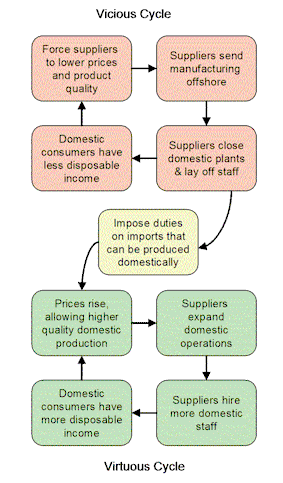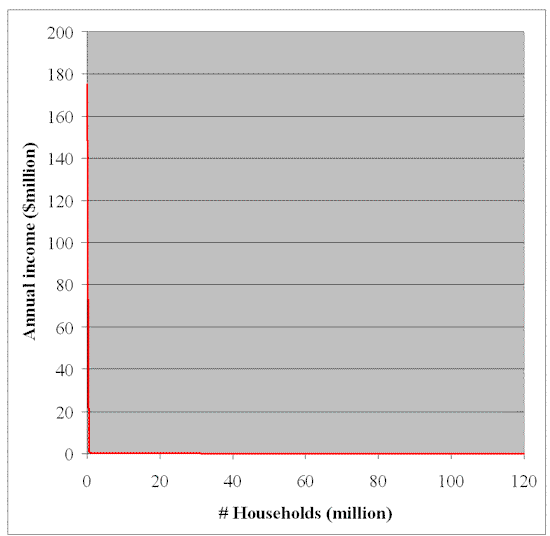|
This is the second in a series of articles that will be published intermittently this month. This article summarizes what I believe were the most important ideas of 2003 in the world of politics and economics. The first article in the series covered the world of blogs & blogging, and future articles will cover business, the arts & sciences, and the environment. POLITICS & ECONOMICS — THE TEN MOST IMPORTANT IDEAS OF 2003
|
Navigation
Collapsniks
Albert Bates (US)
Andrew Nikiforuk (CA)
Brutus (US)
Carolyn Baker (US)*
Catherine Ingram (US)
Chris Hedges (US)
Dahr Jamail (US)
Dean Spillane-Walker (US)*
Derrick Jensen (US)
Dougald & Paul (IE/SE)*
Erik Michaels (US)
Gail Tverberg (US)
Guy McPherson (US)
Honest Sorcerer
Janaia & Robin (US)*
Jem Bendell (UK)
Mari Werner
Michael Dowd (US)*
Nate Hagens (US)
Paul Heft (US)*
Post Carbon Inst. (US)
Resilience (US)
Richard Heinberg (US)
Robert Jensen (US)
Roy Scranton (US)
Sam Mitchell (US)
Tim Morgan (UK)
Tim Watkins (UK)
Umair Haque (UK)
William Rees (CA)
XrayMike (AU)
Radical Non-Duality
Tony Parsons
Jim Newman
Tim Cliss
Andreas Müller
Kenneth Madden
Emerson Lim
Nancy Neithercut
Rosemarijn Roes
Frank McCaughey
Clare Cherikoff
Ere Parek, Izzy Cloke, Zabi AmaniEssential Reading
Archive by Category
My Bio, Contact Info, Signature Posts
About the Author (2023)
My Circles
E-mail me
--- My Best 200 Posts, 2003-22 by category, from newest to oldest ---
Collapse Watch:
Hope — On the Balance of Probabilities
The Caste War for the Dregs
Recuperation, Accommodation, Resilience
How Do We Teach the Critical Skills
Collapse Not Apocalypse
Effective Activism
'Making Sense of the World' Reading List
Notes From the Rising Dark
What is Exponential Decay
Collapse: Slowly Then Suddenly
Slouching Towards Bethlehem
Making Sense of Who We Are
What Would Net-Zero Emissions Look Like?
Post Collapse with Michael Dowd (video)
Why Economic Collapse Will Precede Climate Collapse
Being Adaptable: A Reminder List
A Culture of Fear
What Will It Take?
A Future Without Us
Dean Walker Interview (video)
The Mushroom at the End of the World
What Would It Take To Live Sustainably?
The New Political Map (Poster)
Beyond Belief
Complexity and Collapse
Requiem for a Species
Civilization Disease
What a Desolated Earth Looks Like
If We Had a Better Story...
Giving Up on Environmentalism
The Hard Part is Finding People Who Care
Going Vegan
The Dark & Gathering Sameness of the World
The End of Philosophy
A Short History of Progress
The Boiling Frog
Our Culture / Ourselves:
A CoVid-19 Recap
What It Means to be Human
A Culture Built on Wrong Models
Understanding Conservatives
Our Unique Capacity for Hatred
Not Meant to Govern Each Other
The Humanist Trap
Credulous
Amazing What People Get Used To
My Reluctant Misanthropy
The Dawn of Everything
Species Shame
Why Misinformation Doesn't Work
The Lab-Leak Hypothesis
The Right to Die
CoVid-19: Go for Zero
Pollard's Laws
On Caste
The Process of Self-Organization
The Tragic Spread of Misinformation
A Better Way to Work
The Needs of the Moment
Ask Yourself This
What to Believe Now?
Rogue Primate
Conversation & Silence
The Language of Our Eyes
True Story
May I Ask a Question?
Cultural Acedia: When We Can No Longer Care
Useless Advice
Several Short Sentences About Learning
Why I Don't Want to Hear Your Story
A Harvest of Myths
The Qualities of a Great Story
The Trouble With Stories
A Model of Identity & Community
Not Ready to Do What's Needed
A Culture of Dependence
So What's Next
Ten Things to Do When You're Feeling Hopeless
No Use to the World Broken
Living in Another World
Does Language Restrict What We Can Think?
The Value of Conversation Manifesto Nobody Knows Anything
If I Only Had 37 Days
The Only Life We Know
A Long Way Down
No Noble Savages
Figments of Reality
Too Far Ahead
Learning From Nature
The Rogue Animal
How the World Really Works:
Making Sense of Scents
An Age of Wonder
The Truth About Ukraine
Navigating Complexity
The Supply Chain Problem
The Promise of Dialogue
Too Dumb to Take Care of Ourselves
Extinction Capitalism
Homeless
Republicans Slide Into Fascism
All the Things I Was Wrong About
Several Short Sentences About Sharks
How Change Happens
What's the Best Possible Outcome?
The Perpetual Growth Machine
We Make Zero
How Long We've Been Around (graphic)
If You Wanted to Sabotage the Elections
Collective Intelligence & Complexity
Ten Things I Wish I'd Learned Earlier
The Problem With Systems
Against Hope (Video)
The Admission of Necessary Ignorance
Several Short Sentences About Jellyfish
Loren Eiseley, in Verse
A Synopsis of 'Finding the Sweet Spot'
Learning from Indigenous Cultures
The Gift Economy
The Job of the Media
The Wal-Mart Dilemma
The Illusion of the Separate Self, and Free Will:
No Free Will, No Freedom
The Other Side of 'No Me'
This Body Takes Me For a Walk
The Only One Who Really Knew Me
No Free Will — Fightin' Words
The Paradox of the Self
A Radical Non-Duality FAQ
What We Think We Know
Bark Bark Bark Bark Bark Bark Bark
Healing From Ourselves
The Entanglement Hypothesis
Nothing Needs to Happen
Nothing to Say About This
What I Wanted to Believe
A Continuous Reassemblage of Meaning
No Choice But to Misbehave
What's Apparently Happening
A Different Kind of Animal
Happy Now?
This Creature
Did Early Humans Have Selves?
Nothing On Offer Here
Even Simpler and More Hopeless Than That
Glimpses
How Our Bodies Sense the World
Fragments
What Happens in Vagus
We Have No Choice
Never Comfortable in the Skin of Self
Letting Go of the Story of Me
All There Is, Is This
A Theory of No Mind
Creative Works:
Mindful Wanderings (Reflections) (Archive)
A Prayer to No One
Frogs' Hollow (Short Story)
We Do What We Do (Poem)
Negative Assertions (Poem)
Reminder (Short Story)
A Canadian Sorry (Satire)
Under No Illusions (Short Story)
The Ever-Stranger (Poem)
The Fortune Teller (Short Story)
Non-Duality Dude (Play)
Your Self: An Owner's Manual (Satire)
All the Things I Thought I Knew (Short Story)
On the Shoulders of Giants (Short Story)
Improv (Poem)
Calling the Cage Freedom (Short Story)
Rune (Poem)
Only This (Poem)
The Other Extinction (Short Story)
Invisible (Poem)
Disruption (Short Story)
A Thought-Less Experiment (Poem)
Speaking Grosbeak (Short Story)
The Only Way There (Short Story)
The Wild Man (Short Story)
Flywheel (Short Story)
The Opposite of Presence (Satire)
How to Make Love Last (Poem)
The Horses' Bodies (Poem)
Enough (Lament)
Distracted (Short Story)
Worse, Still (Poem)
Conjurer (Satire)
A Conversation (Short Story)
Farewell to Albion (Poem)
My Other Sites








Interesting graph. Where would the Canadian or German middle class show up on that graph?Millions in income vs millions of people? US Median family income is a bit over $40,000 US 1994 dollars. I’m not sure what defines middle class but looking at the Chart produced by the US Government where Families are divided up into fifths the Middle Fifth had a family income of slightly over $60,000. A two income trap family most likely but fully 40% of US families had incomes HIGHER than that. 20% of US families had an income of over $160,000 a year. Maybe I am missing something. Money is not a real good sign of anything other than money. It is not necessarily an indicator of goodness or even quality of life. The middle class may be shrinking, first define middle class because I can see statistically that 60 Percent of Americans are at or above the median income level (the poor are really poor). The economy is in for a tough time but it ain’t the end of the world. We just got to get some real leadership back in the government. Oh and some realistic values instead of celebrating the bling bling. Americans are the worlds biggest whiners sometimes. On the way to making school and healthcare universal and free I would get rid of commercial TV. Consumerism is a disease.
“The future of Iraq is inevitably division, civil war, and more totalitarianism, and only the Iraqis can, and will, decide when they’re ready for the bold experiment with democracy, on their own terms.”While I’m not disageeing with you on this point, keep in mind that following the American Revolution, the future of the U.S. was inevitabledivision, civil war, and more totalitarianism. It’s part of the process,no matter how the process gets started.”A non-violent, global, connected, consensual politic has the power to withhold consent for war or tyranny”Again, I’m not disagreeing, but just because the non-violent, global, connected,consensual politic withholds its consent for war it does not mean that the waris not justified.”Terrorism is a reaction, not an action”This is a blanket statement that cannot be completely justified. In many instances, this is true, but not in all cases. Some terrorism is an actionbred from hatred and intollerence of differing opinions. Environmental Terroristsfall into this category, as do hate crimes.”Our education system breeds a sense of helplessness, acquiescence, fear, guilt about poverty, and self-loathing”This I agree with, although I doubt you and I would agree on the solution ;-)”The next economy will support consumers holistically to solve their problems, not just sell them products”I don’t agree that this is the “next economy”. I believe that this is the traditional economy and that the current focus on just moving products is a recent trend that is failing miserably.
What about the line from the upper left green box to the upper left red box? It seems to me there must be SOME way we got out of the bottom loop and into the top loop, for manufacturing and now for software development.
“Terrorism is a reaction, not an action.”A reaction to what? It sounds like you are trying to absolve terrorists, and their supporters, from responsibility for their actions. Are you? Did wealthy heirs like Osama and middle-class professionals like Mohammed Atta have no choice but to do what they did?Terrorism is crime, pure and simple, not a “reaction” or a valid policy tool, and must be understood and fought as such. Whatever its stated objective, it erodes the very foundations of legitimate governance and concensus-building; it has irresponsibility and cowardice virtually built into it, and is less controllable and less accountable than even the most brutal army.Anyone who says that terrorism is an inevitable result of poverty, oppression, or whatever injustice is currently in the headlines, is willfully ignoring the billions of poor, oppressed people who do NOT resort to terrorism to solve their problems.There are good people out there risking their lives, their fortunes, and their sacred honor, fighting terrorism and dealing with its dreadful consequences. The very least we can do is scrap the old slogans and engage our minds.